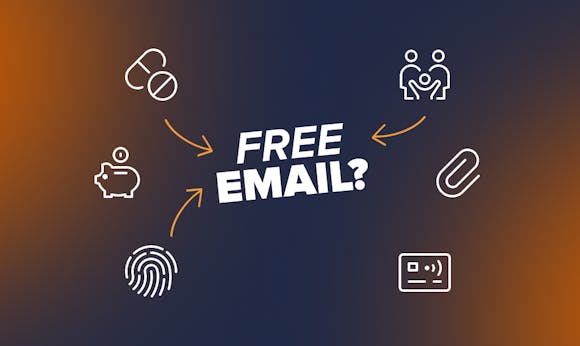
6 Ways That Companies Violate Your Data Privacy
In a world that’s more interconnected than ever, it’s all the more important to know how, when, and why your data is being tracked. You know that StartMail’s private email is a vital tool to protect your privacy, but we can only guard your emails. Nevertheless, we still believe that your right to privacy doesn’t stop at your inbox. That’s why, to commemorate International Data Privacy Week, we want to show you six common ways companies put your privacy at risk and how we can support you in maintaining control over your personal data.
1. Cookies
Nearly every website you visit prompts you to accept or decline some form of cookies, which are small text files that sites and apps use to log your device and activity. Some cookies are relatively harmless and are there to help personalize your internet experience, while others (especially third party cookies) seriously threaten your privacy. Cookies are also not limited to websites; you can find them in emails you open. Companies can be manipulative and may not disclose just how much information they are gathering from you. Many of us tend to scroll quickly through countless user agreements in fine print and blindly accept cookies to access what interests us at any given moment. No need to worry, though! No matter what you agree to, there are steps you can take to prevent this problematic cookie tracking.
StartMail recommends declining any non-necessary cookies and clearing them frequently in the Privacy and Security section of your browser settings. Using a VPN (Virtual Private Network) will also make it much more taxing for companies to keep an eye on your activity. Stay informed and consider privacy extensions like ad blockers to keep your data to yourself. StartMail doesn’t serve ads, and we only use cookies to remember a user's preferences in our webmail portal.
Learn more about how we use cookies responsibly in our support blog.
2. Social Media Posts
Most people have some kind of social media presence these days, whether it's to keep in touch with friends, get inspired, network, or just trade memes with a few friendly mutuals. With the explosion of content creation and social media’s ability to offer huge financial opportunities from just a few viral videos, sharing personal information online isn’t just normalized - it’s encouraged and sometimes even rewarded. But while the rewards can be huge, so can the risks, like potential phishing attacks, harassment, identity theft, and damage to your reputation. Worse yet, every post, comment, and like leaves a trail for tech companies and advertisers to follow. On top of that, watch out for third-party integrations, social media plugins, and sneaky AI tools that analyze your content and behavior. Logging into a social account or pressing a call-to-action button from an individual website could give that company permission to access even more of your social data.
The next time you feel like sharing something personal with the entire Internet, ask yourself: “Is this something I'd want advertisers and other complete strangers to know?” Even then, every social media platform has adjustable privacy settings where you can control the visibility of your data, so don’t be afraid to use them. It is a good idea to avoid linking your email address to your social accounts and giving away your login information to any third parties. Try not to click on embedded content (social media posts shown on a website), unless it is from a source you trust.
StartMail encrypts your communication so it remains completely secure and we offer unlimited email aliases to keep your real email address safe.
3. Location "Services"
Location tracking is perhaps one of the scariest ways a company can track you. Social media, websites, delivery services, mobile applications, and advertising networks all compile location data via location based services (like navigation), location metadata in social posts (not just check-ins), and other spyware… and hold the power to use it against you. Displaying your location online can disclose information about your consumption habits, social and romantic life, medical history, daily routine patterns, and the list goes on. Law enforcement has used it to infer people’s immigration status, religion, and even sexual orientation.
Location services can power useful tools, but must be used properly to bypass risk. StartMail recommends disabling location services for applications that do not absolutely require it. Your navigation application is one of the few that can have access to your location in real time, but doesn’t need to know your location when you’re not using it. We also advise you to turn off location sharing for social media platforms and browsers. Be vigilant about tagging your location in social media posts or sharing social check-ins in real time. Instead, wait a few days before posting those cute pics you begged your friend to take of you at your local cafe.

4. Data Breaches
Unfortunately, data breaches are quite common and can occur for a myriad of reasons: cyberattacks, misconfigured systems, outdated software, weak security, or just one gullible employee who clicked on a phishing email. Data breaches themselves do not track your online activity, but they do put your data in harm’s way. The exposure of sensitive information such as addresses, browsing history, and financial information can lead to illicit use of credit and debit cards, draining of bank accounts, claiming tax refunds or medical expenses in the names of the victims, or, in extreme cases, assuming the identity of others altogether.
To safeguard yourself against your own breach, we advise you to consistently update your software, take advantage of multi-factor authentication, use strong passwords, and monitor your accounts and statements for any suspicious activity. You can recognize a phishing attack by memorizing the telltale signs - prompts to click unfamiliar links, generic greetings, poor spelling and grammar, or attempts to get you to confirm your payment information. You can reduce the risk of these attacks by only sharing payment information, passwords, ID numbers, or other sensitive details with trusted sources through authorized methods. When it comes to safeguarding your information from data breaches that target companies, prevention is the key. Ensure companies have as little data on you as possible. The less they know, the less that can get out there if they end up compromised.
Startmail has several features that can help you with each of the above safeguards. Check out our support blog for a more in-depth analysis on data breaches.
5. Public Wi-Fi
Public wifi is typically available in airports, cafes, hotels, and more to help anyone access the internet for free. While public wifi is convenient for those who need to work from anywhere or have run out of data, it can be a double edged sword (even if the router uses a password). First, there's the danger of having your information funneled through a router that you don't control. That router sees every bit of data that flows through it: web searches, social media activity, private messages, and anything else that’s not encrypted. This presents an opportunity for businesses who want to gather information on their customers or other bad actors looking to get their hands on private data. There’s also the risk of a man-in-the-middle (MITM) attack in which a hacker steals sensitive information by eavesdropping on communications between two online targets such as a user and a web application.
To mitigate risks associated with public wifi, update your passwords frequently and invest in a VPN. It is better to check your bank accounts and do online shopping from the comfort of private wifi. Overall, just try to avoid performing sensitive activities on a public connection.
6. Behavioral Ads
Ever wonder why you see ads so specific that it feels like your phone is spying on you? That’s behavioral targeting in action. There’s no need to listen in on your conversations when it’s simple for a company to design and present an ad to your liking when they know the websites you frequent, the links you click, and the keywords you search for. Here’s how it works: all your private information is fed into an algorithm that produces a digitized version of you. The “digital you” is what companies use to predict and influence your behavior and habits in a way that serves them. Some might think that getting tailored ads is a good thing, but behavioral targeting is inherently sinister/malicious. It encourages negative spending habits and often preys upon vulnerable groups. The WHO highlights that young people and heavy drinkers are increasingly targeted by alcohol advertising, often to the detriment of their health.
All in all, it’s impossible to describe just how destructive and concerning behavioral targeting really is. Worse yet, the only way to truly rid ourselves of it is to ban it, which doesn’t seem likely to happen any time soon. But it is important to remember that your data belongs to you and you should have the choice to permit companies to see it. You can reclaim your power by controlling your browser settings, clearing your cookies, and researching opt out tools and highly rated privacy extensions. For instance, Privacy Badger automatically blocks tracking-enabled advertisements, preventing the RTB process from beginning. If your browser has a “Do Not Track” setting, enable it. If not, then consider switching to a browser that does.
To wrap it up, companies will stop at nothing to get a hold of personal information they can use to benefit their bottom line. The pathways they use to track your data are as cunning as they are invasive. But you don’t have to be a passive participant in their playing field. Back in 2017, The Economist ran an iconic headline: “The world’s most valuable resource is no longer oil, but data.” So why give yours away for free? Your data tells a story and you should be the one writing it. We believe everyone is entitled to as much privacy as they want in their life. Let us be your trusted partner in reclaiming your digital experience.
More from the blog


How AI Threatens Your Email Privacy – What You Need to Know
Continue reading
The Hidden Costs of Free Email – What You’re Really Paying
Continue reading
6 Common Email Scams – Learn to Spot & Avoid Them
Continue reading